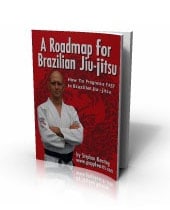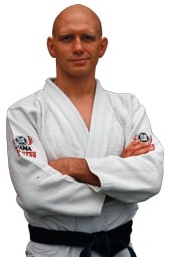First I’d like to congratulate friend and former training partner Denis Kang on his recent victory in Pride Bushido 8 in Japan. He out-punched and out-grappled UFC veteran Andrei Semov to earn a unanimous decision. Even more impressive is the fact that he broke his right hand 4 minutes into the fight, and continued to give the tough Russian hell for the next 11 minutes! Go Denis: I’m sure that we’ll be seeing a lot more of you in the big MMA shows!
Denis’s recent victory in Pride got me thinking about the world of difference between professional and recreational grapplers. Denis and I started Brazilian jiu-jitsu at about the same time, and for a long time following we were neck-and-neck skill wise. Even after he started pursuing his MMA career I could still usually keep up to him on the grappling mat.
Things changed when he quit his job and dedicated himself to full-time training. He got wrestling coaches, boxing coaches and conditioning coaches. He saw dieticians, chiropractors and naturopaths. In addition to jiu-jitsu he started sparring with professional kickboxers and elite-level wrestlers. He started doing two workouts a day, usually taking a nap in between to recover. Basically all he did was eat, sleep, train and recover. He lived and breathed MMA fighting.
Hours and hours of additional training, combined with his superb athletic gifts, paid off. He started catching me in submissions and bad positions much more often than I caught him, and eventually I stopped being able to catch him at all. He had reached an entirely different level than your humble narrator.
There is a danger when a recreational grappler (and that is 99% of people who roll around on a mat) hears about a professional fighter’s training regimen and tries to imitate it. Unless you are already in killer shape, have good genetics, are able to get 10 or more hours of sleep a night, and have few other concerns in your life you simply won’t be able to train at this intensity and duration for very long. You will either get injured or burned out very quickly.
It is important to keep things in perspective: only very few people who train in grappling have the athletic gifts, the determination and luck to make a living by fighting professionally. If fighting professionally is your goal then I salute you, but also encourage you to develop some skills you can use when your fighting career is over. If, like most people, you have a job, family and other obligations you can still reach a high level of skill, but it will take longer.
Look to professionals for inspiration. Listen to them when they talk about technique or share their fight strategy – they’ve worked hard to acquire this knowledge and most are eager to share it. Just keep things in perspective, that’s all.


